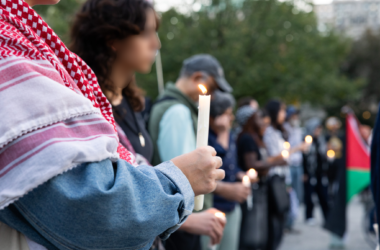
The first item listed in a recent story on the Atlantic Wire website, “The Worst Reactions to the Japanese Earthquake,” was an awkward construction from P.J. Crowley, a U.S. State Department spokesman, on his Twitter page: “We have been watching a hopeful tsunami sweep across the Middle East. Now we are seeing a tsunami of a different kind sweep across Japan.” The offending tweet was later taken down, and Crowley was asked to resign due to this and other recent publicity gaffes.
Only one of several cited examples of “bad reactions” to the quake, the spokesman’s blunder reveals something more than what the website called “questionable metaphors.” It demonstrates the difficulty most of us in North America, relatively insulated from any of the conflagrations ordinarily dominating the world news headlines, have of grappling with successive crises and organizing them into some kind of mentally digestible arrangement. Comparing the very real tsunami sweeping away whole villages in minutes to the “wave” of protests sweeping through the Middle East in recent months demonstrates this. It shows the concern we all feel to not merely jump from worry about one disaster to the next, as the headlines bid us to, but to stay focused, to remember, to not be swept away.
A 1755 earthquake in Lisbon, of roughly the same magnitude as last week’s in Japan, caused European philosophers to reconsider all their previous assumptions. The problem was how such disaster was possible in a world created and governed by God. It has often been said that the earthquake compromised the very structural integrity of previous philosophy. The earth shook—and everything had to be re-thought.
Connected by remote to the farthest reaches of our global village, we in the 21st century have no such luck afforded to those in the 18th century. Those of us with a major news outlet saved as the homepage on our Internet browser have to face disaster multiple times a day. Try to imagine a non-computerized version of this, someone passing a paper before your eyes with large-print, every time you go do something. Open the refrigerator: CLEVELAND RESIDENTS STILL REELING AFTER GANG RAPE OF GIRL, 11. Pour milk into cereal: MELTDOWN ALERT AT JAPAN REACTOR. It’s a nice morning. Maybe step onto the porch, smell the fresh air, watch a squirrel bounding up a tree: 103 ORPHANS CAUGHT IN MIDDLE OF SOUTH SUDAN FIGHTING. Enjoy your breakfast.
Not only is our exposure to disaster more frequent and more immediate than in 1755—think of the unbearably crisp photos you’ve seen from Japan in recent days—but similarly augmented is our individual responsibility to grapple with such realities. The unenviable task of coming up with a conception of the universe in which earthquakes and tsunamis and nuclear meltdowns make sense is now all of ours, not just the philosophers. We have no such comfort of being told what things mean, but face the burden ourselves. I imagine my response of instantaneous and thorough depression is not as unpopular as it sometimes seems—for instance, when walking on St. Laurent, I see everyone enjoying the nearly Spring-ish weather, populating cafés and burger joints, and driving cars, apparently in total ignorance of the fact that the ground under their feet has the power to move.
The problem is exacerbated by the fact that the same agents who bring us news of disaster from the corners of the Earth are the same ones who, next week, bid us to turn our attention elsewhere. The responsibility to sustain sympathies over weeks, to continue to care, is the reader’s alone. “Hell today, gone tomorrow,” media critic Jack Shafer has written on Slate.com.
And still the disasters continue to strike. Our private mental compilations of disasters witnessed, history experienced, continues to lengthen. We are forced to grapple with these realities over a morning cup of coffee. We have no idea what to do.
Yuki Edano, the Chief Cabinet Secretary of Japan, has this advice for readers of the New York Times: “At this point, there has been no major change to the level of radiation leakage outside … so we’d like everyone to respond calmly.” Good luck.





